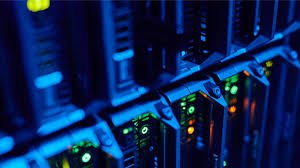As the demand for data continues to grow, the environmental impact of data centers has become a significant concern. Data centers consume a vast amount of energy, contributing to greenhouse gas emissions. The industry is now focusing on sustainable practices to mitigate this impact. These practices aim to reduce energy consumption, utilize renewable energy sources, and improve overall efficiency.
· Energy Efficiency Measures
One of the primary goals of sustainable data centers is to improve energy efficiency. Advanced cooling techniques play a crucial role in achieving this. Traditional air conditioning systems are being replaced with more efficient methods such as liquid cooling and free cooling. These systems reduce energy consumption by using outside air or liquid coolants to maintain optimal temperatures.
Another approach involves the use of energy-efficient hardware. Modern servers, storage devices, and networking equipment are designed to consume less power while delivering high performance. Virtualization and cloud computing also contribute to energy efficiency by optimizing resource utilization. By consolidating workloads, data centers can operate with fewer physical servers, reducing power and cooling needs.
· Renewable Energy Integration
Renewable energy sources are becoming increasingly important in the push for sustainability. Many data centers are now powered by solar, wind, and hydroelectric energy. Some facilities even generate their renewable energy on-site. By integrating renewable energy, data centers can significantly reduce their carbon footprint and reliance on fossil fuels.
Power Purchase Agreements (PPAs) are another way data centers are embracing renewable energy. Through PPAs, data centers can purchase electricity directly from renewable energy providers. This ensures a steady supply of green energy and supports the growth of renewable energy projects.
· Water Conservation Strategies
Water usage is another critical aspect of data center sustainability. Cooling systems often require large amounts of water, which can strain local water resources. To address this, data centers are implementing water-efficient cooling technologies. One such technology is the use of closed-loop cooling systems, which recycle water within the system, reducing the need for constant fresh water supply.
Rainwater harvesting and greywater reuse are also becoming popular. These methods collect and repurpose water for cooling and other non-potable uses. By conserving water, data centers can minimize their environmental impact and contribute to local water sustainability.
· Green Building Certifications
Achieving green building certifications is a tangible way for data centers to demonstrate their commitment to sustainability. Certifications such as LEED (Leadership in Energy and Environmental Design) and BREEAM (Building Research Establishment Environmental Assessment Method) set stringent standards for energy efficiency, water conservation, and overall environmental performance. Data centers that meet these standards can achieve certification, showcasing their efforts in sustainable building practices.
· Advancements in Energy Storage
Energy storage solutions are crucial for integrating renewable energy into data center operations. Battery storage systems allow data centers to store excess renewable energy for use during peak demand or when renewable sources are unavailable. This not only ensures a continuous power supply but also enhances the reliability and stability of the energy grid.
Innovative energy storage technologies, such as lithium-ion batteries and flow batteries, are becoming more prevalent. These technologies offer high energy density and long cycle life, making them ideal for data center applications. By adopting advanced energy storage solutions, data centers can further reduce their reliance on non-renewable energy sources.
· Sustainable Supply Chain Management
Sustainability in data centers extends beyond energy and water conservation. Sustainable supply chain management is crucial for minimizing environmental impact. This involves sourcing materials and equipment from suppliers committed to sustainable practices. It also includes considering the entire lifecycle of products, from manufacturing to disposal, to ensure minimal environmental impact.
Data centers are increasingly adopting circular economy principles. This involves recycling and reusing equipment, reducing electronic waste, and maximizing the lifespan of hardware. By implementing sustainable supply chain practices, data centers can significantly reduce their environmental footprint.
· Impact on the Job Market
The shift towards sustainable data centers is also influencing the job market. As data centers adopt new technologies and practices, there is a growing demand for skilled professionals in areas such as energy management, environmental science, and sustainable engineering. Job roles related to sustainability are becoming more prevalent, offering new career opportunities in the tech industry.
The need for specialized skills in sustainable practices has also impacted job support services. For instance, DevOps job support now often includes training on sustainable data center operations. Professionals in this field must understand how to implement and manage sustainable practices within their organizations.
· The Role of Cloud Computing
Cloud computing plays a significant role in advancing sustainable practices in data centers. By leveraging cloud job support, businesses can transition to more efficient and scalable data solutions.
Cloud providers often operate large-scale data centers that are optimized for energy efficiency and sustainability. This allows businesses to reduce their own environmental impact by utilizing cloud services.
Cloud computing also promotes resource sharing and optimization. By consolidating workloads and utilizing shared infrastructure, cloud computing can reduce the overall energy consumption of data centers. This makes cloud computing a key component in the drive towards sustainable data center practices.
Conclusion
Sustainable practices in data centers are evolving rapidly, driven by the need to reduce environmental impact and improve efficiency. From energy efficiency measures and renewable energy integration to water conservation and green building certifications, data centers are adopting a range of strategies to become more sustainable. These advancements not only benefit the environment but also create new opportunities in the job market and enhance the overall performance of data centers.






Be First to Comment